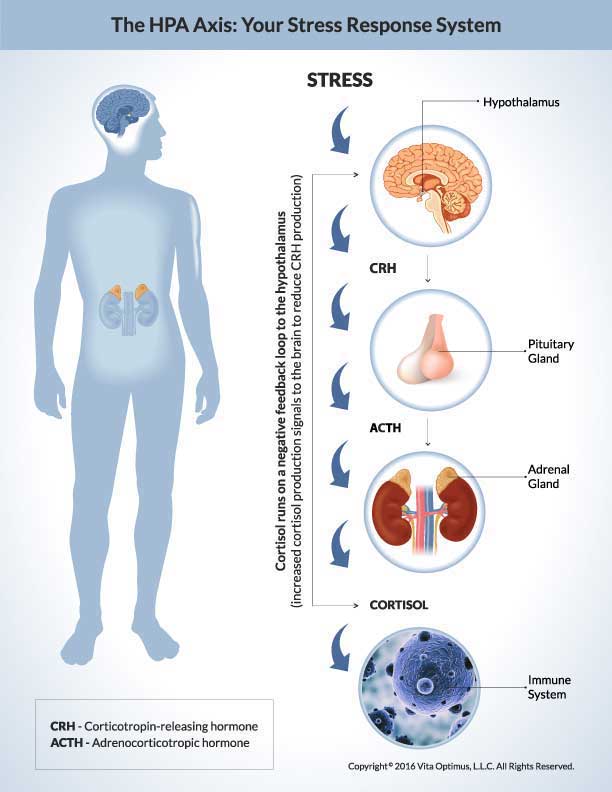HPA Axis Dysfunction Treatment in Dover, NH

Face it: life is stressful. Both at work and at home, and everywhere in-between, you are exposed to stressful situations which cause your body to react and adapt. The hypothalamic pituitary adrenal axis (HPA axis) involves your three major hormone-secreting glands--the hypothalamus, the pituitary gland and the adrenal glands--and is responsible for regulating your body's stress response system in addition to regulating other body functions like mood, digestion, energy, libido and metabolism.
When your body is exposed to prolonged or extreme cases of stress--whether physical, emotional, psychological, environment or perceived stress--your HPA axis can begin to experience dysfunction by overreacting or underreacting to stressful situations. Over time, this can tax many of your body's critical systems: your immune system, your metabolic and hormonal systems, even your cardiovascular and nervous systems. HPA axis dysfunction treatment focuses on optimizing your stress response system to restore overall health.
To schedule a consultation with a healthcare provider in Dover that specializes in HPA axis dysfunction treatment, call (207) 536-9661 or contact Vibrant Health Naturopathic Medical Center online.
How the HPA Axis Works
The hypothalamus--located in the forebrain--is considered the control center of the brain and is responsible for identifying stress and instructing the body on how to react to stressors. In times of stress, it releases a hormone called Corticotropin-Releasing Hormone (CRH) which signals to the pituitary gland--a small organ that sits below the hypothalamus at the base of the brain--to release a hormone called Adrenocorticotropic Hormone (ACTH). ACTH travels through the bloodstream to the adrenal glands--which sit atop the kidneys--to initiate the release of cortisol into the body. Cortisol then influences your body's reaction to the stressful situation by initiating your "fight or flight" response. It can focus your energy on an afflicting stressor by temporarily suppressing the digestive system, insulin production, the reproductive system and your immune response.
The HPA axis works in a feedback loop. As cortisol initiates your fight or flight response, it also sends a signal to the hypothalamus to cease CRH production which thereby ceases ACTH production. This inhibits further production of cortisol, which means that your body can return to its normal state before the stressor, resuming the body functions that were once previously suppressed by cortisol and restoring an overall sense of calm.
In chronically stressed individuals, cortisol is produced in abundance in order to counteract the stress. Over time, the HPA axis can become desensitized to stressful situations and fail to produce adequate amounts of cortisol. Once considered a problem called adrenal fatigue, it is now more understood that this breakdown actually occurs in the feedback loop and impacts the entire HPA axis, not solely the adrenal glands.

HPA Axis Dysfunction Symptoms
With a wide range of symptoms, HPA axis dysfunction can often appear as other conditions like hypothyroidism, fibromyalgia, depression and chronic fatigue syndrome, and go untreated. If you experience any HPA axis dysfunction symptoms, it is imperative you seek guidance from a healthcare professional who understands the complexities of the stress response. These symptoms include:
- Fatigue
- Depression
- Anxiety, irritability and mood swings
- Decreased sex drive
- Weakness
- Brain fog, confusion, memory issues, difficulty concentrating or racing thoughts
- Difficulty sleeping, including morning fatigue or trouble waking, or sleeping soundly but waking up exhausted
- Sugar or salt cravings or other appetite changes
- Inflammation
- Weight gain or weight loss
- Hair loss or abnormal hair growth (like hair on face, neck, chest or back in women)
- High or low blood pressure
- Muscle or joint pain
- Slow wound healing
- Digestive problems, including bowel/stool changes and abdominal pain
- Unusual complaints like dizziness upon standing or rapid heart rate
HPA Axis Dysfunction Treatment
If you experience chronic stress and are suffering from any of the symptoms mentioned above, an integrative healthcare provider can help to diagnose your HPA axis dysfunction. In order to properly diagnose, you may be required to undergo several different tests, including tests to evaluate your hormone levels, overall physical health and neurotransmitter levels. A stress health questionnaire may be another diagnostic tool used. Other diagnostic tests may be used to rule out other conditions, like rare adrenal cancer.
To properly address and correct your HPA axis dysfunction, you must heal your body from the ravaging effects of past stress, reducing as much current stress as possible in your life, and employing relaxation methods when stress cannot be avoided.
Your integrative healthcare provider will focus on healing and re-harmonizing your body's mental and physical systems, using a combination of lifestyle modifications including diet, supplements, physical activity, sleep habits and stress-reduction techniques.
The first and best course of treatment is to follow an eating plan that does not tax your adrenal glands, avoiding foods like caffeine, sugar, processed foods and hydrogenated oils. The Mediterranean diet is often recommended for those suffering from HPA axis dysfunction. The Mediterranean diet replaces processed convenience foods with nutrient-dense choices like omega-3 rich fish (wild-caught salmon or sardines), organic poultry, vegetables and healthy fats from nuts, seeds, olives, avocados and coconut products.
In addition to correcting dietary missteps, your healthcare provider may also utilize helpful HPA axis supplements including dietary supplements which contain these potent nutrients:
- Ashwagandha
- Rhodiola root extract
- Omega-3 fish oil
- Licorice root extract
- L-Theanine
- Magnesium
- B vitamins, especially Vitamin B12
- Vitamin C
- Vitamin D3 with K2
- Zinc
Take Control of Your Stress Response Today
A complete list of dietary, supplement and stress-reduction recommendations can be provided to you by your healthcare provider to restore function to your HPA axis. Your healthcare provider will devise a comprehensive plan that addresses all facets of your health including treatments to address conditions that can often co-occur with HPA axis dysfunction like depression, autoimmune conditions and thyroid disorders.
Don't let stress rule your life. Request more information about HPA axis dysfunction treatment today. Call (207) 536-9661 or contact Vibrant Health Naturopathic Medical Center online.
Vibrant Health Naturopathic Medical Center
Address
3 Riverside DriveGreenland, NH 03840
(207) 536-9661
www.vibranthealthnaturalmedicine.com
Hours
Mon:
8:30 am - 5:00 pm
Tue:
9:00 am - 5:00 pm
Wed:
10:30 am - 5:00 pm
Thu:
9:00 am - 5:00 pm
Fri:
10:00 am - 4:00 pm
Sat:
Closed
Sun:
Closed

